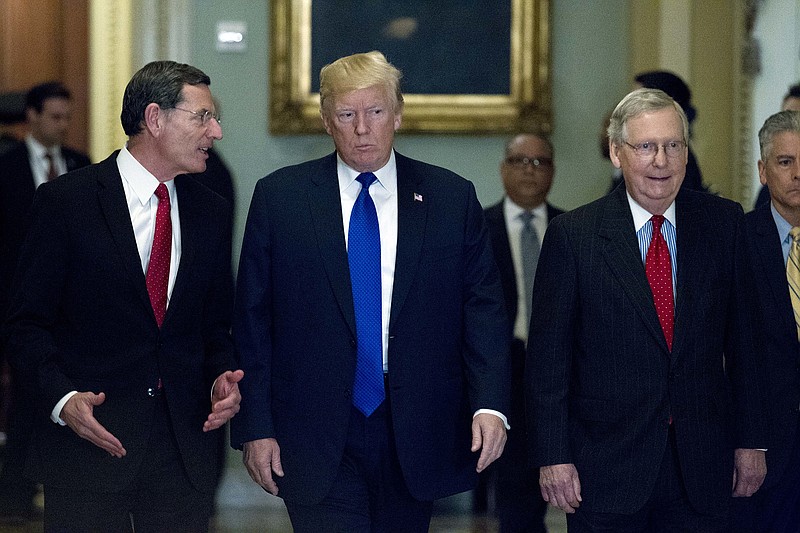President Donald Trump on Wednesday held out the prospect of 6 percent growth of the U.S. economy.
An AP Fact Check finds that to be a fanciful hope, but small business proponents of the pending tax cutting reform plan said Wednesday they expect the economy to pick up steam from lower taxes.
"So we're at 3.3 percent GDP," Trump told his cabinet. "I see no reason why we don't go to 4 percent, 5 percent, and even 6 percent."
Most mainstream economists think the country will be lucky to achieve consistent annual growth much over 2 percent. The economy last had economic growth of the level Trump wants in 1984, when growth hit 7.3 percent. But that was a fleeting performance and a much different time.
The workforce was flush with baby boomers in their prime working ages; now they're starting to retire.
And the Fed boosted growth by steadily slashing a key interest rate from its 1981 peak of 20 percent.
The economy has grown at better than a 3 percent annual rate for each of the past two quarters - a faster pace than any similar period under President Obama. By cutting corporate tax rates, raising the individual deduction and allowing more repatriation of foreign funds back into the United States and quicker expensing of capital purchases, the tax plan working its way through Congress may help further boost the economy.
The Joint Committee on Taxation, a nonpartisan group of experts, estimated last week that the Senate tax plan would add about 0.8 percent to economic growth over the next decade and recover about a third of the $1.5 trillion of tax cuts.
Ray Keating, chief economist for the Small Business and Entrepreneurship Council, said Wednesday he hopes economic growth will accelerate from the tax plan as more money comes back into the United States and more businesses have more money to invest in productivity improvements to boost wages and investments to spur more overall growth.
"We've had poor economic growth for a long time, averaging only 2.2 percent coming on the Great Recession," Keating said.
That growth pace is only half the historic norm for a rebounding economy and has meant 3.4 million fewer businesses have started in the United States.
Daniel LeVan, managing director of ENERG3 in Chattanooga and the 2017 Small Business of the Year winner, said he thinks the tax plan would pay for itself in more economic growth. LeVan said the tax plan would help him and others with international business to bring more of their foreign investments and earnings back into the United States and also encourage more business investments and activity. That should help encourage more companies and municipalities to invest in his energy efficiency programs, which usually return a healthy 20 percent of the amount invested.
LeVan was among those last week who met with the sole Republican in the Senate to vote against the GOP tax plan, U.S. Sen. Bob Corker, R-Tenn., who said he opposed the measure because it is projected to add at least $1 trillion to the national debt over the next 10 years.
LeVan said he respects Sen. Corker, but thinks the extra economic and wage growth sparked by the tax plan would create enough additional economic growth to offset the lower tax rate
"Four tenths of a percent greater GDP growth would pay for these tax cuts and there is no increase in the deficit," LeVan said. "Tax reform is long overdue and it does not have to add to the deficit."
